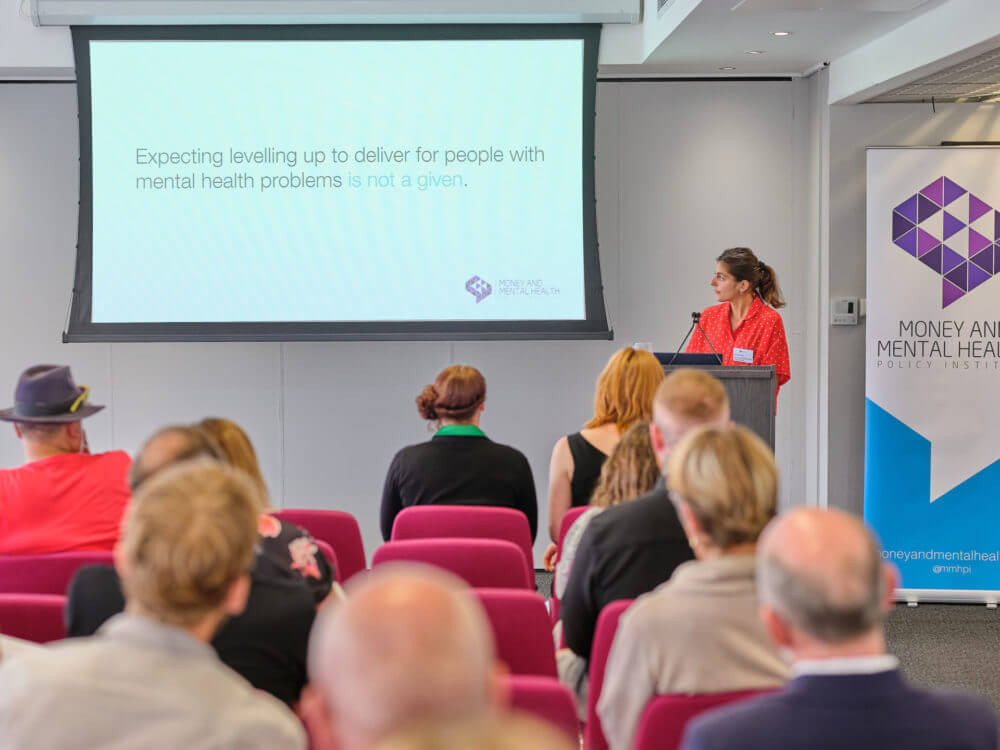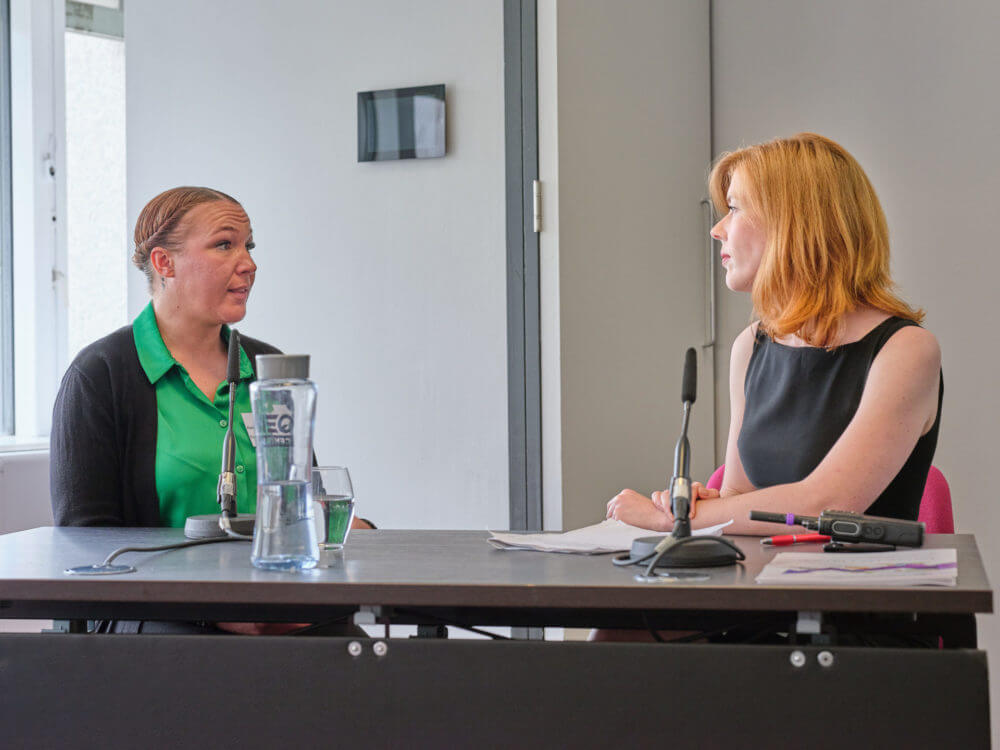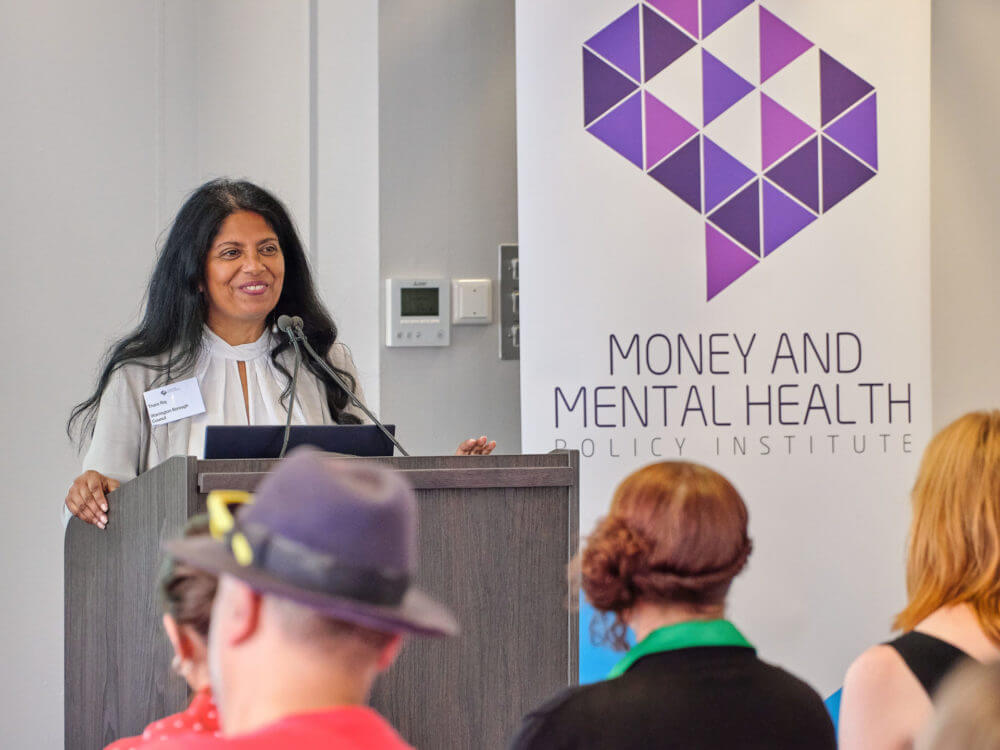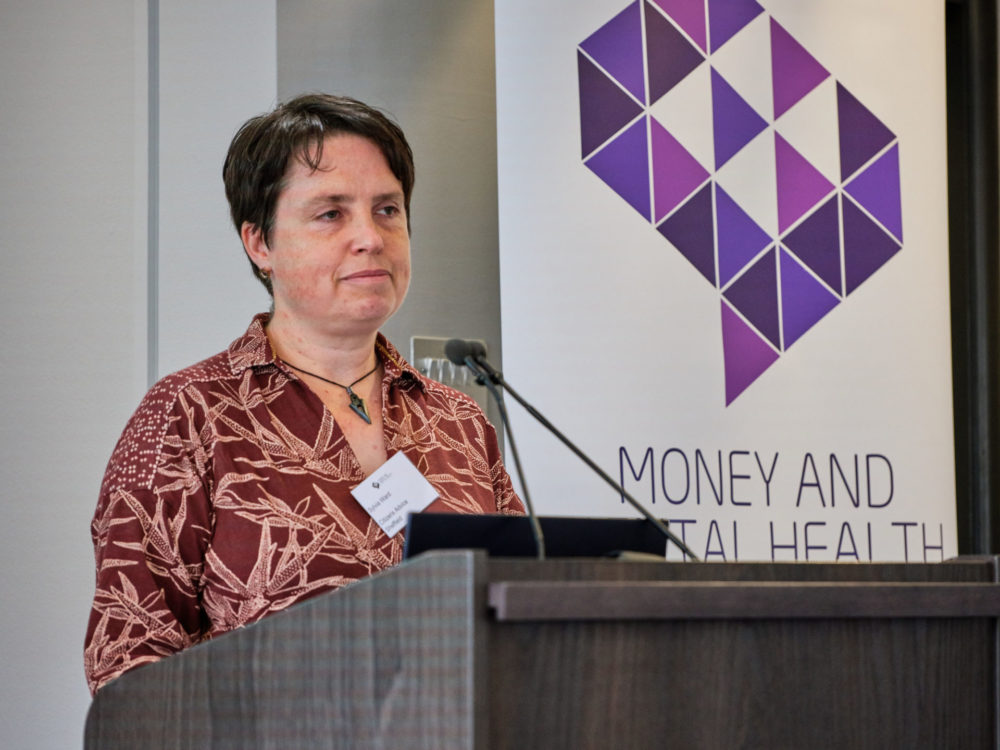
Dom Taylor, External Affairs Intern, Money and Mental Health Policy Institute
Event catch-up: Launching our Levelling Up report
22 July 2022
Last week, we launched our new report ‘No one left behind’ – which shows the huge impact where you live has on your mental health and finances, and exposes the UK’s ‘inequality hotspots’.
To mark the launch, we invited people together for our first in-person event in over two years, to hear how the Levelling Up agenda can be improved to help people with mental health problems.
Becca Stacey: The report’s key findings

With the stage set, Senior Research Officer and co-author of the report Becca Stacey presented the findings of the research. Becca revealed the significant economic gap people with mental health problems face in certain areas of the UK – with those in Northern Ireland and the North West of England being left the furthest behind.
She then shared some of the factors which contribute to these ‘inequality hotspots’ – including access to employment, the cost of living, and access to services like banking and debt advice. Finally, Becca highlighted some of our key recommendations for local and national government on closing the gap faced by people with mental health problems before we moved on to our exciting line-up of speakers.
Rachael Morgan: A chance to listen to lived experience

Our work is defined by the testimony of our Research Community of people with experience of mental health problems. That’s why we were delighted to have Rachael – a member of our Research Community – join us. Rachael spoke about her experience of poor mental health and financial problems, and how aspects of this were made all the more difficult by where she lived. In particular, she highlighted the lack of accessible mental health services in her area as a key obstacle.
“I wasn’t impressed with the amount of time I had to wait… you get a referral from the GP and it’s a 12 week waiting time… But in that time frame, a person’s mental health has usually deteriorated more before it comes to attending the first appointment.”
Inaccessibility of mental health services, as well as financial advice services, is a significant factor identified in our report as contributing to inequalities for people with mental health problems. As Rachael pointed out, prompt action is essential in ensuring that further damage to your mental and financial wellbeing is prevented.
Professor Sir Michael Marmot: Are the government committed to levelling up?

Following Rachael, Professor Sir Michael Marmot offered his reflections on our new research. Drawing from his own work on the social determinants of health, Professor Marmot spoke about the relationship between financial hardship and poor mental health, and the effect of the cost of living crisis.
“The tussle of trying to make ends meet in the face of low-income…and the cost of living crisis will put perhaps another 300,000 children into poverty. And the stress in the parents not only impacts on their mental health, but has long-term impact on the children’s development, and their physical and mental health.”
Professor Marmot described the “incoherence” of the current Levelling Up agenda – a project that requires significant investment, but which has never received significant attention in any of the previous Chancellor’s budgets. Disappointed with Westminster’s efforts, Professor Marmot nevertheless closed his remarks with a note of optimism. Pointing to his own collaborative research in Manchester and Cheshire & Merseyside, Professor Marmot expressed hope that health equity is climbing higher on the list of regional decision-makers’ priorities.
Thara Raj: The public health perspective

Next Thara Raj, Director of Public Health at Warrington Council, took to the podium. In the spirit of sharing lived experience, Thara began by describing the case of a Warrington resident who was referred to the financial inclusion unit within her wellbeing team, during a period of unemployment and bereavement. Thara’s team, by combining support that recognised the mental and financial needs of their client, were able to support the individual in a way that recognised their needs.
But although they were successful in helping this particular client, Thara noted a key challenge her team faces – knowing how many people out there are in need of support.
“We are failing people with poor mental health – there’s no doubt about that… and there are greater numbers of people with mental health problems in areas of deprivation.”
Thara concluded her thoughts by emphasising the necessity of mental health prevention, as well as the challenges in securing funding for this. She reiterated that those in need can’t be expected to go it alone, and that there has to be a strong group effort to combat these systemic inequalities.
Sylvia Ward: How are services delivering for people with mental health problems?

Our final speaker was Sylvia Ward, Chief Executive of Citizens Advice Sheffield. Working in such a large and diverse area, Sylvia drew from the backgrounds of her clientele, acknowledging that many clients who use their service also experience mental health problems. With the cost of living crisis setting in, Sylvia noted that the numbers of people seeking help will only rise – how they will be able to help that new wave of clients is less certain.
Although offering remote services has allowed them to reach more people, Sylvia acknowledged that over-the-phone appointments don’t always meet the needs of people with mental health issues.
“As this report shows, remote services don’t work for everybody. For people with complex needs, face-to-face services are essential.”
Sylvia described her team’s commitment to offering hybrid services. Working alongside their specialist mental health advice service to provide welfare advice, information and casework for people with long-term mental health needs.
The results that both Thara and Sylvia are able to achieve highlights the power of local actors, but the challenges they face show that more support is needed from central government.
Looking ahead
Having the opportunity to hear the speakers’ thoughts on our work was invaluable, not only because they reflected the findings of our report, but because they painted a genuinely promising future for tackling financial and mental health inequality within and across regions.
Read our full report – No one left behind – here.
For a full audio recording of the event, listen here.
